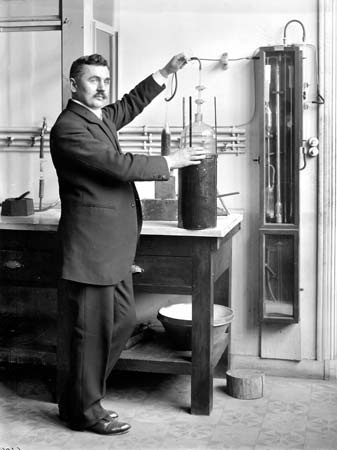Claude, Georges
French engineer
born Sept. 24, 1870, Paris, France
died May 23, 1960, Saint-Cloud
 engineer, chemist, and inventor of the neon light, which found widespread use in signs and was the forerunner of the fluorescent light.
engineer, chemist, and inventor of the neon light, which found widespread use in signs and was the forerunner of the fluorescent light.In 1897 Claude discovered that acetylene gas could be transported safely by dissolving it in acetone. His method was generally adopted and brought a wide expansion to the acetylene industry. Independently of the German chemist Carl von Linde, he developed a process for producing liquefied air in quantity (1902). Although he proposed the use of liquid oxygen in iron smelting as early as 1910, his suggestion was not adopted until after World War II.
While studying the inert gases, Claude found that passing electrical current through them produced light, and in 1910 he developed the neon lamp for use in lighting and signs. With the introduction of inner fluorescent (fluorescent lamp) coatings, the fluorescent light was developed and began to replace the incandescent lamp in industrial and certain home-lighting uses.
Claude also developed a process for the manufacture of ammonia in 1917 that was similar to the process developed by the German chemist Fritz Haber. In his efforts to find new sources of energy, he conducted experiments in producing electricity from the difference in temperature between the ocean floor and the surface.
A supporter of the Vichy government during World War II, Claude was afterward imprisoned as a German collaborator from 1945 to 1949.
- Manuel de Falla
- Manuel de Godoy
- Manuel del Popolo García
- Manuel Deodoro da Fonseca
- Manuel dos Santos Lima
- Manuel Estrada Cabrera
- Manuel Ferreira
- Manuel García
- Manuel González
- Manuel Gutiérrez Nájera
- Manuel Gálvez
- Manuel I
- Manuel I Comnenus
- Manuel II
- Manuel II Palaeologus
- Manueline
- Manuelito
- Manuel José Quintana
- Manuel Lisa
- Manuel Lopes
- Manuel (Luis) Quezon (y Molina)
- Manuel Machado
- Manuel Maria Barbosa du Bocage
- Manuel Montt
- Manuel Moschopoulos